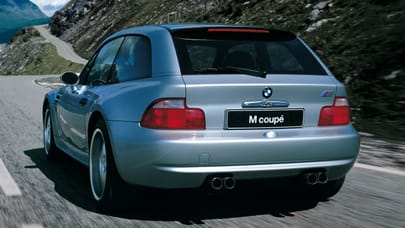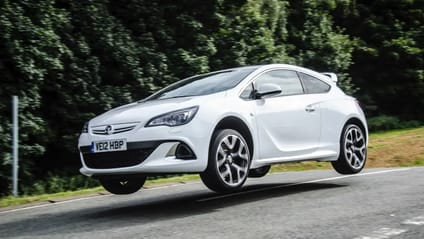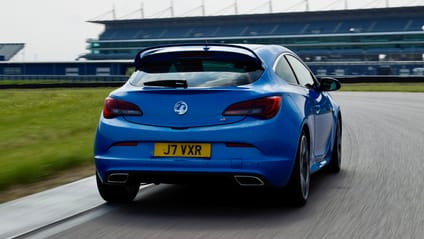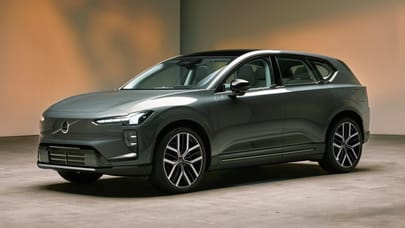
Top Gear’s guide to buying a used Vauxhall Astra
Britain’s homemade hatch has sold by the Bedford-load for decades. Here’s why

What is it?

It’s the Vauxhall Astra, a medium-sized hatchback that’s also been a saloon, estate, convertible, delivery van, hot hatch and touring car at one point or another. Astra means ‘stars’ in Latin, and Vauxhall means ‘that bit of London where they used to make Vauxhalls’.
Interestingly enough, Vauxhall apparently comes from ‘Faulkes’ Hall’, the manor in which the favoured soldier of King John, Sir Falkes de Bréauté, once lived. In fact, Sir Falkes’ emblem was apparently a Griffin, which goes some way to explaining the badge on the bonnet of the Astra.
Advertisement - Page continues belowWhat’s so good about the Vauxhall Astra?

To a certain extent, that depends on how invested you are in local car companies and local manufacturing. If you champion it (and you’ll get no arguments here), then the Astra is the homemade car from the hometown manufacturer. Sure, it’s an Opel by any other name, and Vauxhall has been owned by General Motors (and later Peugeot, then Stellantis) since the Twenties, but the local outfit never felt like it was just one arm of a vast conglomerate.
Cars like the Chevette HSR, ‘droopsnoot’ Firenza, Monaro VXR500 (a supercharged version of the already plenty punchy Australian muscle car) and the early Astra GTEs always gave the impression that Vauxhall cared about making cars, rather than just churning them out. So when utter dross like the Vectra arrived, there was always the impression that Vauxhall was doing the best it could with the source material foisted on it by GM’s upper management. And in the main, Vauxhall made solid, dependable cars for the people, much like its brother from another mother / bitter rival Ford.
Cars like the Astra, in fact. Despite any number of entreaties by car reviewers to buy a Focus, or Golf (or Civic, Auris, Mazda 3, Skoda something or other...), routinely selling in the tens (and sometimes hundreds) of thousands year after year. Apparently, a quarter of all British drivers have, at one point in their lives, driven an Astra.
It’s rare to see a second-hand Astra that hasn’t been thoroughly used, so clearly it does enough, well enough, and without too much faff to keep it going. As a result, owners tend to keep Astras long past the point where it would have been economically sound to trade in and change up.
What’s so bad about the Vauxhall Astra?

Nothing really standout, like a propensity to self-immolate, shed vital componentry or rust at a rate that rivals late-Seventies Lancias. Really, the Astra’s biggest problem seemed to be one of comparison – it was a fine enough car in isolation, but always felt like it was, at best, meeting industry benchmarks, rather than setting them.
Whether that was the driving experience, which was never as entertaining as the Focus, or the interior (and indeed badge cachet), which could never match up to the Volkswagen, the Astra always seemed to be a good car in a category already full of great ones.
Advertisement - Page continues belowWhat are the common problems?

Beyond a few things that Vauxhall picked up on and issued recalls for, not a great deal. There’s no notorious Achilles’ heel, Icarus’s wings, or Samson’s barnet here, like an IMS bearing or head gasket with a best before date. So, as long as the services and recalls have all been done (really do make sure), nothing’s going to fail, fold or fall to pieces in anything approaching a spectacular manner.
Water can get into the rear brakes and gearshift cables and cause enough corrosion to seize, the driver’s seat heater can need new connectors and it’s possible that condensation from the air conditioning can get into the unit that controls the wipers, horn, central locking and so on. All are easy enough fixes to be a DIY job with a Haynes manual.
Other than that, you’ll get trim rattles in the cabin, diesels can clog their particulate filters after lots of short trips (hardly an Astra or even Vauxhall-specific problem) and there is the slight possibility of being bored to death if you choose one with a small diesel engine, But an Astra that’s been looked after and serviced regularly, that’s done a reasonable number of miles and isn’t currently submerged in Windermere should be OK.
What engines and trims are available?

If there’s one thing the Astra was good for, it was a plethora of powerplants. Not sure exactly how much use that was to the buying public, but depending on the year and market, you could pick from as many as six different petrol options and four diesels. What we find even more insane is that, over the past two generations of Astra (not including the current one) and 19 different engine configurations, all fall between 1.0 and 2.0 litres. Surely we could have done without a couple of those?
Adding to the confusion is which trim level was needed to ascend to the better engines, what that trim level was called in your part of the world, and – perhaps beside the point a touch – the unsolved mystery of which bit is the mortar and which is the pestle. OK, so the mortar is the bowl bit. Phew. We can move on.
In any case, if you’re searching for an Astra, we can narrow your selection of engines and trim levels a bit. OK, here goes: don’t get a diesel.
Nothing wrong with them versus other diesels – its tenure as a Reasonably Priced Car, being thrashed around Dunsfold should prove that – but the sheer price of diesel these days, how many cities are shunning them completely and the fact that they sound like a half-broken garage door is probably reason enough.
As for the petrol versions, we’d suggest looking to higher outputs and larger displacement. Yes, we’re Top Gear and therefore honour-bound to offer that sort of advice, but there’s also the fact that the Astra has been exceedingly popular as a rental car for decades now, and anything entry-level could be ex-rental.
Is it safe?

If we just say ‘Yes, it is safe’, that does rather feel like inviting some kind of recrimination down the road, of the ‘You said it was safe, but I ran over mine with an AS90 self-propelled howitzer and there’s no way I would have survived if I were inside’ variety.
But if you are on a public road, street or laneway, you’re driving to conditions and you happen to have a collision, you can take some solace in the fact that the Astra has had a five-star Euro NCAP rating since 2004. We’ll note, as always, that Euro NCAP assessment programmes have changed over the years, becoming more strict and further-reaching with each update. So a five-star rating from 2004 is good, of course, and still better than a three-star rating from the same year, but a five-star rating in 2009 or 2015 is going to demonstrate more comprehensive crash protection.
How economical is the Vauxhall Astra?

It’s not beyond the pale to see official economy figures reach as much as 75 and 80mpg for a 1.6 diesel from a few years back. This is a) parsimony of a level that approaches abstinence, and b) a figure that may as well be written in Khmer numerals for all its practical application to the daily life of your average Briton. Chalk it up to the... let’s say optimistic assumptions of the NEDC testing cycle. With that said, real-world figures of 55 to 60mpg are nothing to sneeze at. And if you must, do it into your elbow. So if you drive long distances, have no need to enter city centres and have enough good music and podcasts to avoid being bored into a stupor, the 1.6 diesel might actually be something worth considering.
At the other end of the scale is the VXR, with a not-inconsequential 276bhp 2.0-litre turbo petrol. Official figures suggest something like 36mpg; we wish you the very best of luck with that.
For the rest of us, a 1.6-litre turbo petrol is likely to be the best bet for a decent balance of enjoyment and economy. Without any special kind of effort on your part, it’ll do somewhere around 34 to 38mpg, and offers nigh-on 200 horsepower – and 0 to 62mph in the mid-sixes – when economy takes a back seat.
Advertisement - Page continues belowHow does the Vauxhall Astra drive?

Fine, really.
Yes, it’s damning with faint praise, but the great big heaps of praise were always lavished on the Ford Focus, Renault Megane (at least in the RS guise) and Volkswagen Golf. Depending on the group test in question, the Astra tends to earn anywhere between a plucky mid-placed finish or the wooden spoon. With the caveat, of course, that it’s wonderfully comfortable, solid and generally quiet, but hardly the last word (or indeed the first, fifteenth or penultimate word) in driving enjoyment.
Even the VXR – a reliably rapid bit of kit – does suffer a bit in comparison to something like a contemporary Focus ST, Golf GTI or Megane RS. Maybe just drive it without comparing it to others, and ruminate on the concept of ‘good enough’?
How fast is the Vauxhall Astra?

Well, depending on the presence of a ‘VXR’ badge on the back, whether said badge came from the factory or from eBay and how far you’ve pressed that right-hand-pedal, pretty flipping fast. If you were to put drivers of broadly equal talents in a Renault Sport Megane 265 and an Astra VXR and send them out on a track, they’d basically level-peg around the whole circuit. As wonderful as the Megane RS is, it’s hard to argue with 276bhp and 295lb ft. Well, it’s actually not that hard to argue, as long as you don’t mind losing the argument. This is an Astra that knocks over a nought to 62mph sprint in less than six seconds... the mind boggles.
Not every Astra is so brisk, of course. If the 1.3 diesel’s official nought to 62mph time of more than 12 seconds feels a bit lethargic, we should point out that the rental-spec 1.4 petrol felt even slower. Possibly because an episode of Mr Bean had more torque*.
Nevertheless, anyone who’s ever got one as a rental will attest that this is more of a challenge than a problem – it’s amazing how important momentum can become when it takes half an ice age to get it back again.
* OK, spoken jokes are still not the same as written ones... always good to remind ourselves
Advertisement - Page continues belowWhat’s the interior of the Vauxhall Astra like?

Mmm, about that. While the new Astra looks lovely inside and out, older cars were... certainly Vauxhalls. The recently superseded Astra – as in the last General Motors-based car – was arguably the best of the bunch in that regard, with things getting progressively worse as we wind the clock back.
But you could say that about almost any car – if there’s one change that anyone can pick up on, it’s how much car interiors have improved since the turn of the millennium. With that said, the Astra was never ahead of its contemporaries at any point in its history in terms of interior materials, design or aesthetics. Plenty comfortable, though, even for big’uns.
Which is actually something of a Vauxhall staple, to be fair. The largest member of the Top Gear team not only fits comfortably in any Astra made this century, but can also fold himself into a Corsa if the situation calls for it.
How reliable is the Vauxhall Astra?

OK, we’re doing our level best to not invoke platitudes like ‘at the end of the day’, ‘on balance’ or ‘all things considered’, but when you have questions that ask for a blanket assessment of four decades’ worth of automobile... you see where we’re going here.
So we’ll say that the Astra is generally a reliable machine, if one that has a few serious issues and points of failure that Opel issued recalls for, as well as some niggles that affect the perceived quality. Squeaking, rattling and knocking sounds aren’t exactly what we equate with a well-built, solid product, even if the root cause is as simple as a loose plastic clip on a piece of interior trim. No judgement here, by the way – if there’s one thing that drives us absolutely spare, it’s a trim rattle, and we’ve found it on everything from old bangers to brand-new, six-figure cars. Guess which one we’re a bit more philosophical about?
In any case, if time and circumstances permit, it’s always worth chasing down various rattles, regardless of the car you have. Doing so will give you the peace of mind that the noise doesn’t indicate anything serious – or reveal a worsening issue before it becomes catastrophe. And with life as generally noisy and stressful as it seems to be, surely you want your car to be a calm refuge from the barrage?
Getting back to the Astra specifically, you’ll actually find fairly disappointing results from various owner surveys. That could be a case of poor data – people with something to complain about will be more likely to complain than those doing thousands of trouble-free miles – but if the Astra’s competitors are being rated by like-minded people, it doesn’t add up to a good result for the Griffin.
Depending on the year and survey in question, the Astra actually tends to score quite poorly, which seems at odds with a) how many you see on the road, b) how few you see on the back of a truck, and c) how well the Astra keeps selling. And if it’s not because it’s the best handling, most entertaining, fastest, cheapest or most attractive car in its class – or with the best badge attached to the bonnet – what is it that keeps buyers coming back?
How much does the Vauxhall Astra cost to insure and tax?

Vehicle tax rates in the UK are a mix of confounding complexity and brain-draining boredom. There’s one rate for new cars bought after April 2022, another for those bought after April 2017 but before April 2022, another for anything before April 2017 but after March 2001. And presumably another if you were born on a leap year, your second toe is longer than your first or you have a pet swan called Alan.
In any case, the Astra never cost more than £40,000, nor emitted more than 225 grams of carbon dioxide per kilometre. The reasons that these figures matter are both detailed and dull, but it does mean you’ll never be paying the kind of tax rates that really start to hurt. Once you cross that 225g/km threshold for pre-2017 cars, yearly tax goes from £360 a year to £615. And if the Astra were a £40k proposition... well, you can’t imagine anyone would buy one, but if they did, they’d be slugged with an extra £355 a year to tax it.
Trending this week
- Top Gear Advice
Here are 19 brilliant cars that are cheaper than you think







